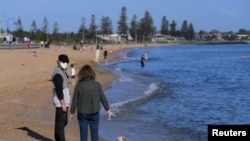Some of Australia’s toughest coronavirus restrictions imposed in Melbourne have been relaxed as recorded daily cases continue to fall. The Victorian state government has said there will be a staged easing of lockdown measures in the coming months if infection rates decline. Australia has had about 26,600 confirmed COVID-19 cases and more than 800 people have died.
Melbourne has been in lockdown since early July, but as daily coronavirus cases fall, some measures are being relaxed. A nighttime curfew is starting an hour later, playgrounds are reopening and more outdoor exercise is permitted under the first of a four-step recovery plan.
But strict stay-at-home orders remain in place in Australia’s second-most populous city. Schools and child care centers are closed, while cafes and restaurants can offer only take-aways. Shops might not be allowed to reopen until the end of November. The gradual reopening of businesses and the return of personal freedoms will depend on how quickly rates of infection decline.
Victoria state Premier Daniel Andrews says the lockdown measures are working, but he acknowledges that life is hard for a community where freedoms are restricted.
“It is challenging out there," he said. "I know it is difficult, but the strategy is working and that is something that is altogether the product of enormous sacrifice and hard work that each and every Victorian who is following the rules, playing their part. That work is what is driving these numbers down. I am absolutely grateful, absolutely grateful to every single Victorian who is doing that important work and staying the course, so that we properly defeat this second wave.”
Critics say the measures are too harsh and are wrecking the economy. Nationally, the pandemic has sent Australia into recession for the first time in three decades.
The Victorian government has extended a state of disaster for another month, giving the police extra powers to enforce public health orders. Seventy-four people were arrested Sunday during illegal anti-lockdown protests in Melbourne.
On Monday, Victoria recorded 35 new cases of coronavirus in the past 24 hours and seven more people have died.
The southern state is at the heart of Australia’s COVID-19 crisis, accounting for 75% of cases and 9 in 10 fatalities. A judicial inquiry is investigating claims that security failures in the hotel quarantine system for travelers returning from overseas allowed the virus to spread into the community, causing a devastating second wave of infections.
Melbourne’s lockdown will continue until at least September 28, but disease-control measures in the rest of Victoria state will likely be eased this week because of low rates of infection. The city will move to step two of its recovery plan if the average number of daily cases over a two-week period is between 30 and 50.
((Phil Mercer for VOA News, Sydney))




